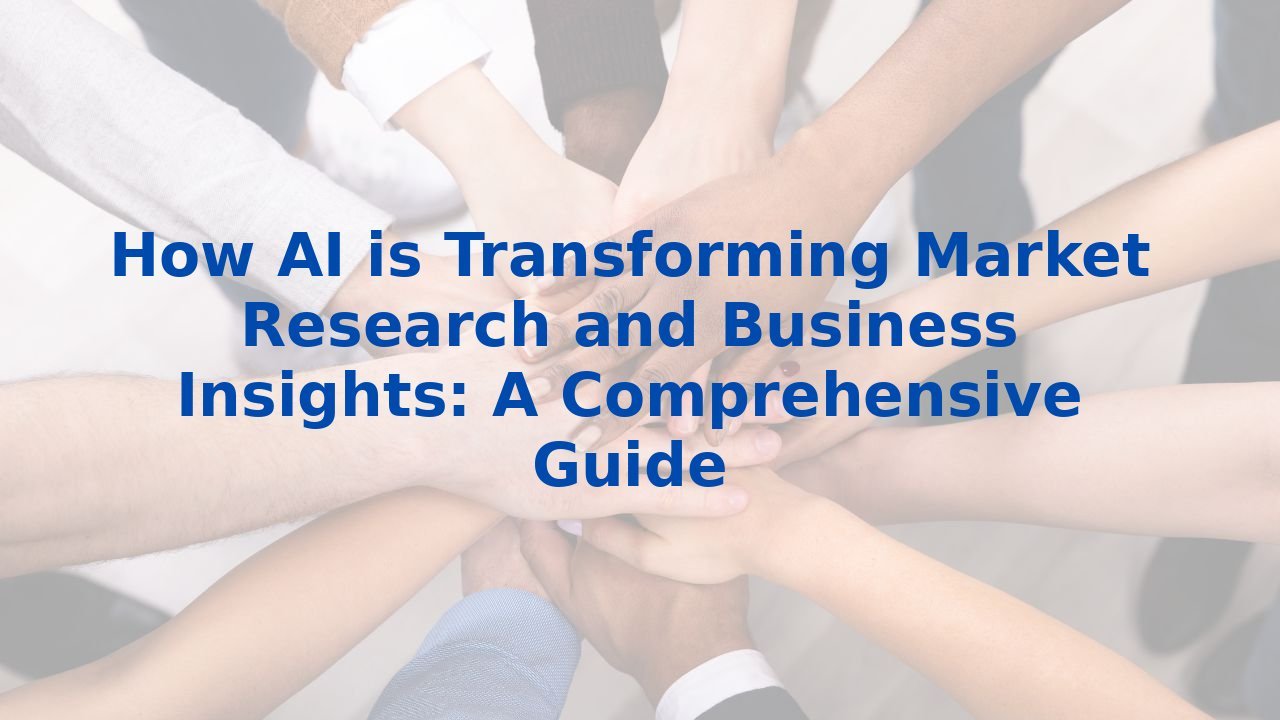How AI is Transforming Market Research and Business Insights: A Comprehensive Guide
How AI is Transforming Market Research and Business Insights: A Comprehensive Guide
Introduction
In a business landscape that’s constantly evolving, organizations are on a relentless quest to enhance their operations and stay one step ahead. At the heart of any successful business strategy lie market research, business insights, data analysis, and awareness of emerging trends. Enter artificial intelligence (AI)—a transformative force that is not just enhancing these processes, but redefining them entirely.
The Role of AI in Market Research
AI's capacity to streamline market research is groundbreaking. By automating data collection and analysis, it redefines how businesses gather and interpret information. Consider the following key advancements:
- Data Collection: AI quickly aggregates vast amounts of data from diverse sources such as social media, customer feedback, and market surveys. The speed and scope of data collection mean businesses can stay updated and responsive.
- Data Analysis: Thanks to advanced algorithms, AI can suss out trends, patterns, and insights that might elude human analysts. This depth of analysis minimizes gaps in understanding that can impact strategy.
- Market Segmentation: AI excels at identifying specific demographics and preferences, allowing for a hyper-targeted approach in marketing and product development.
- Competitive Analysis: By dissecting competitors' strategies and market positions, AI provides insights that prove invaluable in crafting competitive advantages.
How AI Enhances Business Insights
Informed decisions hinge on robust business insights, and AI elevates this process significantly:
- Automating Reporting: The tedious work of generating reports can be automated, resulting in accurate insights delivered in real-time.
- Predictive Analytics: By leveraging historical data alongside current trends, AI can forecast future market behaviors, ensuring businesses are proactive instead of reactive.
- Real-Time Analysis: AI's ability to process and analyze data in real time equips businesses with insights that require immediate attention, facilitating swift decision-making.
The Impact of AI on Data Analysis
The core of any sound business strategy rests on effective data analysis. Here’s how AI transforms this essential process:
- Automating Tasks: Repetitive tasks, such as data cleaning and processing, can be automated, liberating human analysts to tackle higher-level, strategic questions.
- Identifying Patterns: AI excels in recognizing complex patterns within data that traditional methods may overlook, unlocking rich insights that inform overall strategy.
- Providing Insights: The actionable insights generated by AI can guide decision-making processes, transforming raw data into strategic advantage.
The Benefits of AI for Improving Efficiency
Integrating AI within business processes paves the way for a suite of benefits:
- Increased Efficiency: Automation of routine tasks and the swift analysis of expansive datasets lead to a significant reduction in time spent on these activities.
- Improved Accuracy: The risk of human error diminishes, fostering a more reliable and consistent output.
- Enhanced Decision-Making: Real-time insights and predictive analytics empower businesses to make informed decisions, steering clear of missteps.
The Importance of Training Employees for AI
While AI brings remarkable efficiency and insights, employee training is paramount for leveraging these tools effectively:
- Understanding AI Tools: Knowledge of how to use AI tools optimally is essential for maximizing their potential within the organization.
- Data Quality: Employees play a crucial role in managing high-quality training data. Understanding data relevance is essential for accurate AI training models.
- Interpreting Results: Employees need to extract actionable insights from AI-generated results, enabling informed and confident decision-making.
Conclusion
AI is on the brink of revolutionizing market research, business insights, and data analysis. By automating repetitive tasks, delivering real-time insights, and supporting improved decision-making processes, AI is set to enhance organizational efficiency in profound ways. However, this potential can only be fully realized through dedicated training of your workforce to effectively engage with AI technologies.
Envision a future where your employees are not just users of AI, but architects of strategic excellence driven by informed decision-making. That’s the true power of AI integration.
For those eager to explore this transformative avenue, consider investing in comprehensive AI training for your organization, enhancing not just efficiency, but capability across all levels of operation.



